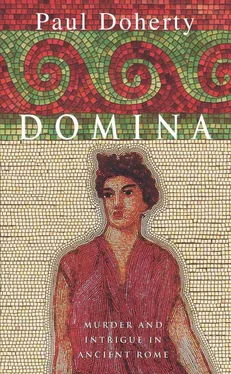Paul Doherty - Domina
Здесь есть возможность читать онлайн «Paul Doherty - Domina» весь текст электронной книги совершенно бесплатно (целиком полную версию без сокращений). В некоторых случаях можно слушать аудио, скачать через торрент в формате fb2 и присутствует краткое содержание. Год выпуска: 2012, ISBN: 2012, Издательство: Headline, Жанр: Исторический детектив, на английском языке. Описание произведения, (предисловие) а так же отзывы посетителей доступны на портале библиотеки ЛибКат.
- Название:Domina
- Автор:
- Издательство:Headline
- Жанр:
- Год:2012
- ISBN:9780755350490
- Рейтинг книги:3 / 5. Голосов: 1
-
Избранное:Добавить в избранное
- Отзывы:
-
Ваша оценка:
- 60
- 1
- 2
- 3
- 4
- 5
Domina: краткое содержание, описание и аннотация
Предлагаем к чтению аннотацию, описание, краткое содержание или предисловие (зависит от того, что написал сам автор книги «Domina»). Если вы не нашли необходимую информацию о книге — напишите в комментариях, мы постараемся отыскать её.
Domina — читать онлайн бесплатно полную книгу (весь текст) целиком
Ниже представлен текст книги, разбитый по страницам. Система сохранения места последней прочитанной страницы, позволяет с удобством читать онлайн бесплатно книгу «Domina», без необходимости каждый раз заново искать на чём Вы остановились. Поставьте закладку, и сможете в любой момент перейти на страницу, на которой закончили чтение.
Интервал:
Закладка:
The guards returned that evening. Under the cover of darkness, Agrippina and I were bundled onto a cart and taken secretly out of Rome to a warship at Ostia. It took a full day’s sailing before we reached the island of Pontia, seventy miles off the coast of Naples. It was a pleasant enough place with woods and fields, a beautiful villa on the promontory and a small theatre nearby. The commander of the guard delivered Caligula’s message.
‘Remind my sister,’ he had said, ‘that I have daggers as well as islands.’
Agrippina heeded the advice. She behaved herself. The greatest punishment was the absence of her beloved son who had been given into the care of Domitia Lepida, one of Caligula’s favourite great aunts. If fortune’s wheel was spun again, that was one woman marked down for destruction. Agrippina kept herself busy. She took up the study of botany, birds and wild life, and used the kiln to make pottery. She organised a set routine every day: we would rise early in the morning, and she would run down to the beach to swim and then return for a light meal. She would eagerly seek out any news from the mainland, write letters which were never sent and go out into the fields to collect specimens. If the weather turned harsh, she’d stay inside and work the kiln. She proved to have skilful hands and taught me how to paint the pots. Never once did she openly discuss Rome, Caligula or her son. Since most of the slaves and servants were spies, what conversations we did have took place at the dead of night when Agrippina was certain there was no one around.
I could have become her lover. Sometimes we shared more than a jug of wine, and would sit, hand in hand, or embrace.
One night I did grow amorous but she starkly pointed to a cobweb. ‘Did you know, Parmenon, that the female spider eats her mate?’
She drew away. ‘People like you, Parmenon, should have nothing to do with the likes of me. I have the same blood as Caligula. Everyone we touch dies violently. The Furies nest close to us.’
I heeded the warning. As the months passed, Agrippina was allowed more visitors and messengers from Rome, but they were only spies attempting to provoke some admission or treasonable remarks. They did bring news of her brother and his mad antics, hoping to provoke her.
Caligula had decided to launch an all-out war against the Germans. Eager to emulate his own father’s triumphs, he assembled an enormous force of some quarter of a million troops, with a huge convoy of military equipment and food. The Emperor himself, however, travelled with a retinue of gladiators, actors and women. When he reached the Rhine he downgraded certain commanders and executed others on the grounds that they had conspired with his sister against him. Caligula then decided that he was the embodiment of Mars, but could find no one to fight him so he arranged for his German bodyguards to sneak across the Rhine and hide in the forest. One day, as the Emperor was finishing lunch, his scouts told him that the enemy were gathering. His bodyguard, pretending to be the enemy, launched a fictitious ambush. Caligula had them captured and brought back in chains. In honour of his triumph, Caligula had all the surrounding trees shorn of their branches and decorated the stumps with trophies. When the news reached Rome, the Senate pretended that Caesar had won a great triumph, and poor Uncle Claudius was sent north to congratulate the victorious Emperor. Caligula was furious that such a clumsy messenger had been sent and had his uncle pitched into the Rhine for his pains.
Eager for a fresh triumph, Caligula marched the army into Gaul, having decided to invade Britain. He assembled his forces along the sea coast in full battle order. Catapults and other engines of war were all primed. Caligula took to sea in a trireme, travelled a short distance and then returned to shore. He ordered the trumpeters to sound the charge. Caligula rode along the beach, instructing his soldiers to attack the sea and use their helmets and shields to pick up shells as plunder and spoils of their great victory against the God Neptune.
After this nonsense, he marched back to Rome. On the way he stopped at Lyons where he auctioned off all of Agrippina’s property and possessions. He also organised a contest in Greek and Latin oratory in which the losers were forced to present the prizes to the winners as well as erase their own contributions, some with a sponge and the worst with their tongues. If they didn’t like this they were given a choice of being beaten with rods or thrown into the nearby river.
Caligula continued his march on Rome, his carts full of seashells. He added a few captives and deserters from Gaul, making them grow their hair long and dyed. These unfortunates were taught a little German and were given barbarian names. Caligula was eager for his Triumph: the Senate and people of Rome had no choice but to accept this farcical turn of events.
Agrippina bore the loss of her property and possessions with equanimity. She listened to such news, nodded and then returned to her flower collection.
One visitor, however, brought secret messages. Cassius Chaerea, a tribune from the Praetorian Guard, had been sent by Caligula to search the island and ensure that Agrippina was observing the terms of her exile. I’ve never met a soldier who looked more like a woman. Agrippina conceded he was better looking than her: tall and graceful with a long, slim, olive face and dark expressive eyes. My mistress said he had lips and eyelashes which any girl would envy. Nevertheless, Cassius was a seasoned soldier and, from the beginning, it was obvious that his heart was not in his task. Agrippina studied him for a few days then summoned me to our usual meeting place on the cliff top.
‘Cassius has brought me news from Rome. The Emperor’s madness is now the talk on everyone’s lips.’
‘And your son?’ I asked, trying to hide my jealousy. ‘You persuaded Chaerea to talk about your son?’
Agrippina smiled and whistled under her breath. ‘Are you jealous, Parmenon?’
‘You dress your hair,’ I replied. ‘You put paint on your face and bathe your body in perfume. You wear the most elegant robes and always arrange for Cassius to sit near you when we eat. You are not trying to seduce him, are you?’
‘Oh, I’ve already done that,’ Agrippina murmured. ‘Last night.’
I recalled Agrippina leaving the evening meal early, complaining she felt unwell, the usual sign that she wished to be left alone. Chaerea had retired an hour later.
‘I didn’t think you’d be so stupid!’ I retorted.
‘What’s Cassius going to say?’ Agrippina snapped. ‘That he dared seduce the Emperor’s disgraced sister? I know every mark on that beautiful body. More importantly, I have found a man who hates Caligula even more than I do. Do you think the army liked that stupid spectacle on the coast, escorting carts back into Rome full of seashells?’
‘That doesn’t make Chaerea a traitor,’ I replied.
‘Oh, Parmenon, think back to last night and the other times we’ve talked with Cassius. Every time I mention Caligula he blushes slightly. I discovered why: Caligula calls Cassius a girl. One of Chaerea’s tasks is to ask the Emperor every day for the personal password.’ Agrippina bit back her laughter. ‘Caligula teases him with replies such as “Vagina”, “Penis” or “Kiss Me Quick”. Can you imagine the roars of laughter which greet this? Cassius also tells me that others hate Caligula just as much as he.’ She tapped me on the hand. ‘Now, for practical news. My husband Domitius has done us all a favour by dying of dropsy. I won’t be a hypocrite — I didn’t give his life a passing thought, so why should I mourn his death?’
‘And your son?’ I demanded.
‘A bouncing boy with red curls. He’s already ordering about the other children in the nursery.’
Читать дальшеИнтервал:
Закладка:
Похожие книги на «Domina»
Представляем Вашему вниманию похожие книги на «Domina» списком для выбора. Мы отобрали схожую по названию и смыслу литературу в надежде предоставить читателям больше вариантов отыскать новые, интересные, ещё непрочитанные произведения.
Обсуждение, отзывы о книге «Domina» и просто собственные мнения читателей. Оставьте ваши комментарии, напишите, что Вы думаете о произведении, его смысле или главных героях. Укажите что конкретно понравилось, а что нет, и почему Вы так считаете.












